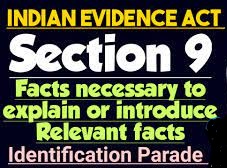In this article we shall study statements by persons who cannot be called witnesses particularly with respect to dying declaration. A fact to be proved by oral evidence must be stated before the court by a person who has first-hand knowledge on the facts to be proved. Second-hand evidence is loosely termed as hearsay evidence. […]
Category: Indian Evidence Act
Section 24 to 30 of Indian Evidence Act deal with relevancy of `Confession’ in criminal proceeding. The term “Confession” has not been defined in Indian Evidence Act. In simple words `confession’ means admission or acknowledgement of guilt by person accused of crime. Sir Stephen in his Digest of the Law of Evidence has defined that […]
According to Section 17 of the Indian Evidence Act, 1872 an admission is a statement, oral or documentary or contained in electronic form, which suggests any inference as to any fact in issue or relevant fact, and which is made by any of the persons, and under the circumstances, hereinafter mentioned. Section 17 IEA defines […]
Object of Section 11 of the Indian Evidence Act, 1872 is to admit those facts which will help in sorting fact in issue even though they are irrelevant and this section enlarges the scope of admission of relevant facts. But limitation is put by the provisions of section 5 to section 55 i.e., if that […]
Section 10 deals with the admissibility of evidence in a conspiracy case and is based on the theory of implied agency i.e. every conspirator is an agent of this association in carrying out the objects of the conspiracy. The special feature of the section is that anything said or done or written by any member […]

Sec. 9 deals with relevancy of facts which are introductory or explanatory in nature, or supports or rebuts a fact in issue or a relevant fact, or which establishing identity of a person or thing. There is a kind of evidence which if considered separately and alone from other evidence would not amount to anything, […]

According to Section 17 of the Indian Evidence Act, 1872 an admission is a statement, oral or documentary or contained in electronic form, which suggests any inference as to any fact in issue or relevant fact, and which is made by any of the persons, and under the circumstances, hereinafter mentioned. Section 17 IEA defines “Admissions” […]

According to Section 17 of the Indian Evidence Act, 1872 an admission is a statement, oral or documentary or contained in electronic form, which suggests any inference as to any fact in issue or relevant fact, and which is made by any of the persons, and under the circumstances, hereinafter mentioned. Section 17 IEA defines “Admissions” […]
Kinds of Witnesses
Witnesses play a very important role in the dispensation of justice in its totality. At the initial stage of investigation, a witness guides the Investigating Officer (I.O.) in the right lines thus helping him arriving at correct findings about facts and circumstances of the crime. It is not exaggerated to say that no prosecution case […]
Admissions

An admission is a statement of fact which waves or dispenses with the production of evidence by conceding that the fact asserted by the opponent is true. It is a voluntary acknowledgement made by the party or somebody identified with him in legal interest. The Supreme Court observed that admissions are very weak kind of […]